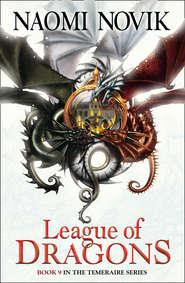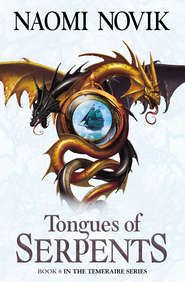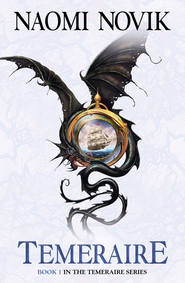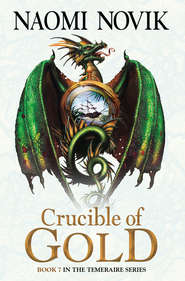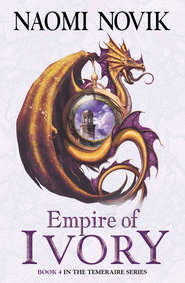По всем вопросам обращайтесь на: info@litportal.ru
(©) 2003-2024.
✖
Blood of Tyrants
Автор
Год написания книги
2019
Настройки чтения
Размер шрифта
Высота строк
Поля
She put them on her back again, when they had eaten the rest of the rice dish, and she had drunk the rest of the wine, and she tramped down the hill through a faint cold drizzle towards the river. “Put the baskets on,” she said, stopping on the shore, “and let us get under way! It’s a long way to Ariake, and we will have to stop and get something to eat along the way.”
There was a sort of harness resting upside-down underneath a little lean-to by the shore: two tightly woven baskets, watertight, lined thickly with straw and a final lining of fabric. These were joined to each other with straps which went about her body; each was big enough for a man to climb inside, and when Laurence and Junichiro had strapped it upon her and ensconced themselves so, Kiyo plunged into the river and swam out into the deep part of the current, very like a horse bearing saddlebags.
Almost directly they had left the curve of the river leading to the temple, they were in settled countryside: women and children on the banks, washing clothing and carrying water, waved to them with enthusiasm as they passed, and fishermen poled small vessels out of their way, yielding precedence. Laurence had bundled his hair beneath a scrap of his old shirt, and he hunched his shoulders and looked down as they sailed onwards to avoid any comment on his features: he was increasingly conscious that any journey overland would have offered scarcely any hope of success.
Junichiro for his part also kept his head down; from what Laurence could see of his expressions, he seemed to be caught in a confused welter of pleasure and misery. His delight in the dragon’s company, and in the condescension she had shown them, was very plain; it was equally plain he did not feel himself deserving of it, and Laurence would not have been surprised to have him burst out in confession of his crime at the least encouragement.
Fortunately this was not immediately forthcoming. The two of them might have been traveling alone, for Kiyo’s head was nearly always submerged beneath the surface as she carried on against the current, her long tendrils streaming away to either side around her like trailers of seaweed caught on a ship’s hull. Her speed was indeed remarkable: better than six knots, Laurence judged.
“Will you tell me about the course we are on?” Laurence asked Junichiro, when they were on an isolate curve of the river, hoping as much to distract him as to learn more of his circumstances: they seemed to have been swept up beyond his control for the moment.
“You must have done something notable in a past life,” Junichiro said, half to himself, as though trying to explain to his own satisfaction what had brought them so much undeservedly good fortune. Laurence, for his part, should have liked to know what he had done either evil or good so as to produce all the ills of his present situation, but as he did not accept Junichiro’s explanation, he could only attribute it to some forgotten act of his lost eight years. “And we are on the Chikugo River, following it to the Ariake Sea,” Junichiro added. “That is between Chikugo Province and Hizen Province—”
“Hold, you leap too far ahead,” Laurence said, and made Junichiro explain a little more of the geography of the nation, a small country like his own; they were upon the island of Kyushu, which after a little description Laurence mentally classed with Scotland: it was not the largest, nor the site of the capital, but the home of considerable wealth and industry; and this divided into several provinces.
“Nagasaki is in Hizen Province, on the western side of Kyushu—and Hizen is on the Ariake Sea, like Chikugo, so it will be much easier to get to there,” Junichiro added, and with a finger dipped in river water sketched him a very rough shape on the dry part of the dragon’s back, which shortly evaporated but left Laurence with the comfort, not inconsiderable for a man who was used to knowing his precise latitude and longitude at nearly every moment, of having some approximation of his bearings.
Junichiro said it should require the entire course of the day, to see them to the shore of the inland sea; Laurence settled himself low in his basket and prepared only to wait: the rocking motion of their journey was familiar, and he was ready to yield himself to sleep when cries from the bank started him up. He looked and saw a small crowd of people urgently waving a banner bearing several large-painted characters in red, which they had been in the process of rigging out on the riverbank from a signpost.
“Oh,” Junichiro said, taken aback, and Laurence, looking over, wondered if this were to their account—couriers, he supposed, might have carried around a warning to be posted to try to capture them. But after a brief hesitation, Junichiro reached down into the water and tugged on one of Kiyo’s tendrils.
Her head burst from the surface, rivulets streaming away, and the people on the riverbank renewed all their clamor; she did not hesitate for an instant herself, but immediately shifted her course out of the river’s current towards them, and as they neared Laurence could see the chief of the delegation, as he supposed, bowing deeply before they had even come to shore.
Kiyo climbed out partway onto the shore to speak with this man, balancing herself on forelegs in a pose reminiscent of the great sea-dragon which Laurence had seen. The conversation, naturally, proceeded entirely in Japanese. Laurence crouched in his basket and tried as best he could to avoid any notice, which effort met with success only because no-one present showed the least interest in Junichiro or himself; all their attention was fixed on the dragon.
It struck him abruptly that Kiyo also had no captain, no master; as neither had Lady Arikawa nor Lord Jinai, nor even the light-weight who had ferried about the magistrate and his servants. Laurence was startled, and startled even more that he had not even noticed it before this moment; he had thought nothing of it at all.
It ought to have been certain proof of an untamed ferocity. Dragons required a captain, harness, crew, all the forms of control, to be tolerated anywhere near settled country, or they would rampage and destroy; any beast not so restrained could only be penned in breeding grounds and bribed with cattle to remain there. So Laurence had always supposed—so he had always known. But even as he articulated to himself this commonplace understanding, it rang false. Proof to the contrary was before him, of course—but that should have seemed peculiar, disconcerting, and did not.
He had not managed to explain it to himself when the discussion concluded and Kiyo turned her head over towards them and said, “Down you get!”
Junichiro obeyed at once, and leapt to unbuckle the baskets; Laurence had scarcely any alternative but to follow his example, and hide his face from the expectant delegation by keeping it turned towards her side. They at least did not immediately seize him. Unburdened, Kiyo plunged back into the river and opened her jaws: she began at once to swell up into that wide immensity which Laurence had witnessed the previous evening. This time when she had reached her full size she did not bring the water forth again, but swaying and ponderous dragged herself up onto the shore, and in a strangely gargled voice gave direction. The delegation all turned and set out along a track that led away from the river, carrying their banner with them.
“What is happening?” Laurence asked Junichiro quietly, as they trailed in Kiyo’s wake; but he might have reserved his questions. The path turned quickly out of the trees and opened onto a truly splendid wide-open vista: a series of very wide terraces falling away from them down a sloping hillside, each full of water and faintly green with the earliest sprouting of rice plants, though surely the season was too early. There was yet a sharp chill of frost in the air, which Laurence thought must be inimical to any farming, although only to be expected at this time of year.
At the summit stood a great stone basin with a wide irrigation channel running away from it down the hill: peering over, Laurence could see more channels leading to either side into each terrace. The delegation here broke up, and most of the number went running swiftly down narrow pathways along the hillside, calling notice: workers in the fields, who were mostly busy staggering under yokes of water-buckets, raised their heads from beneath wide-brimmed hats and, seeing the dragon, hurried to take themselves out of the terraces until they were lining the hillside paths.
From a village visible at the base of the hill, a neat hamlet of thatch-roofed houses, more people were streaming to join the welcoming party, children running with a cheerful clamoring; more banners were being carried out of a larger house, perhaps ceremonial, and set at the foot of the hill in bright array.
Kiyo was leaning forward into the basin and dipping her face into it, shaking her head so the tendrils made a great cloud around her. Laurence could hear a peculiar gurgling and hissing from her side, an internal noise like a man digesting an excessive meal. She raised her head up and shook off the droplets, and then nodded to the anxiously waiting delegation. Two of the great banners had by now reached the summit and were fixed to either side of the basin, cracking in the wind. All were standing silent, in attitudes of tense expectation.
Kiyo adjusted her position, and then she opened her jaws wide and began to expel the water into the basin: not in any massive quantity at first, a thin stream like the jet of a small fountain, but Laurence was astonished to see the water so hot that it was steaming in the open air. Shortly the rime of white ice, half-an-inch wide, which edged the pool in the stone basin had melted entirely away, and water was running softly away down the channels. Kiyo paused in her work and put her face into the basin again—perhaps working out in some way the desirable degree of heat—and then she sat up again and began once more, in earnest.
The gush of water came out of her jaws as from a kettle, steaming-hot, and went running down to water all the fields—likely saving them from that very frost which Laurence had noticed. As he watched the process, he realized that the Japanese might well receive from this influence an entirely additional growing-season: if they might rely on such a rescue, when a frost threatened the crop, they might begin the first planting earlier, and take the second harvest later, and get two crops instead of one. Their urgency was easily explained, now; having drawn the attentions of a water-dragon so soon likely had saved more of the crop.
When Kiyo had reduced herself back to her original dimensions and closed her jaws again, and the men along the hillside had tried each shallow terrace and waved one after another their banners in signal of success, the general relief was nearly palpable. More bowing and ceremonial thanks ensued, and though there were no effusions, no broad beaming expressions, even so shoulders had straightened; anxiety had lifted. Laurence could not fail to interest himself in proceedings so foreign to his experience, and yet so familiar: he had ridden the estate with his father on occasion as a boy, and there was not so great a difference between the expressions of the tenants receiving relief in the case of some disaster to their crops or homes, and the present—though his father had not nearly so dramatic a support to offer.
Nor so general: the entire village had benefited, here, and it was at once apparent they meant to show their appreciation in proper form: an ox was led up the hill, lowing in anxiety as it came nearer the dragon, and was shortly butchered before them. The tender offal was flung immediately into a hot pan over coals: sweetbreads and heart and liver and brains, and these having been quickly seared were presented to Kiyo, who devoured them delicately while the great sides of beef were carried away to prepare some more elaborate offering. Other preparations were already in train—cooking-steam was issuing from many of the houses below and baskets of cooked rice beginning to emerge; the leaders of the delegation were seating themselves formally on mats placed around Kiyo’s head.
“Well, we will be a little late getting you to the sea,” she said cheerfully, looking around to Laurence at last, as she settled herself down to eat, “but at least we do not need to worry about eating. How delicious good, fresh beef is!”
The remark fell, unfortunate, loud. Whether they merely had more leisure now for interest, or her addressing him drew attention, several heads turned: the village chief, some other of the older men and women, and Laurence found himself regarded with dawning astonishment, in a widening circle of silence.
Chapter 5 (#ulink_cf8ab756-25b4-5842-83a3-ce164bf1a6a0)
Temeraire’s spirits had been equal to the challenge of thinking Laurence swept overboard and flung onto the shore, even in the face of general doubt and disagreement; but he began to find it difficult to sustain his confidence, knowing Laurence in such dreadful circumstances: not merely a shipwreck in a strange country, alone, but with every hand against him—every man his enemy, every dragon.
Temeraire could not bring himself to choke down more than a few swallows of soup and rice to share room in his belly with the lump of anxiety, nor could he take any pleasure even in the egg, though Granby and Roland had spoken to him several times that afternoon, anxiously, and remarked upon how nicely it came along. Ferris also had complimented it, very prettily, while Forthing scowled at him and then only stammered out his own attempt—which no-one wanted, anyway; but in neither case could Temeraire raise much of either satisfaction or irritation. He lay unhappy upon the dragondeck, watching the harbor traffic more from a dull consciousness of duty than from any real interest.
The Japanese boats which crowded the harbor, though not large, were well-handled: fishermen and porters and barges. Besides these and the Chinese ships, the Dutch ship stood out in the harbor: a clipper, with a long and narrow draught for her three masts; she would be a fast sailor, Temeraire thought vaguely. He did not much care about her; she was no danger, as she was all alone, and would scarcely have made a threat to the Potentate even without aerial support. He could not see that she had any guns at all.
She did have a dragon: at least, she had put out a pontoon-platform for one to rest upon, and he wore harness, so he was a Western dragon, surely, although his harness was a little strange and looked like nothing so much as a waistcoat, at this distance. But he was only a light-weight, a little bigger than Dulcia, and not very dangerous-looking: a very ordinary sort of brown speckled with cream, with a long and narrow snout and broad forehead. Certainly he did not look anything like the sea-dragon; if anything he looked more like Churki in the conformation of his body, though he was not feathered, of course.
He did not stay at the ship for very long at any one time, but flew busily back and forth to the shore several times over the course of the afternoon carrying substantial parcels away from the ship, which the crew delivered to him over the side with pulleys, and taking them to the shore, where he held several conversations with some party, whom Temeraire could not make out at the distance, before returning to his own ship.
On the fourth pass, Temeraire suddenly picked up his head. “Roland,” he said, “that ship there, that is Dutch; she is lawful prize, is she not?”
“Oh?” Iskierka said interrogatively, waiting with interest for the answer.
“Oh,” Roland said, looking sidelong, “well, I suppose she is, as she is under Dutch colors; but—”
“No, no,” Temeraire said, “I do not mean to take her—”
“Whyever not!” Iskierka interrupted.
Temeraire snorted at her. “Because we have more important matters to consider than prize-taking, at present! But if she is lawful prize, then I suppose she is quite afraid of us; they are taking those parcels to shore, so we should not get them if we decide to demand she strike. Nitidus,” he said, twisting his neck around and over Iskierka, to peer awkwardly at him, “would you be so kind as to go over to that dragon there, and invite him to come and have a cup of tea with us, if you please?”
“But,” Nitidus said, “but you don’t suppose they will shoot at me?”
“Of course they will not shoot at you,” Temeraire said. “We are all here, quite ready to come over and answer anything they like to try against you; but if you like,” he added, “you may hang out a flag of truce, so they are not worried when you come.”
Roland looked a little anxious, and ventured that she might go and speak to Captain Warren before Nitidus should go; but Captain Warren and the others were at dinner: Hammond had in great haste arranged that all the captains should eat together that evening, as his guests. He only wanted to better argue with them all at once more conveniently, but that did not give anyone an excuse for refusing when Hammond was the King’s envoy, no matter how rude his own behavior or late the invitation.
“Besides, I am not going to do anything: we are only going to have a conversation,” Temeraire said, “so pray do go over, Nitidus,” and he was persuaded to go, carrying a scrap of white sailcloth streaming away.
Temeraire watched the encounter anxiously: he was quite sure they would not fire on Nitidus, he hoped; but even so, perhaps the other dragon would not like to come; or perhaps he would not speak either English or French, which was all that Nitidus could do, although in such a case he hoped there might be a translator aboard the ship. But Nitidus was received, if not with visible pleasure, at least with no hostility; the brown dragon politely made room for him to land on the platform, and listened with attention to his message, as did several men leaning over the ship’s side straining with ear-trumpets to overhear.
Temeraire nudged the others beside him, when he saw the brown dragon look over, to make an inviting open place for him to land on the deck. That was no easy feat—Captain Blaise did not like to put out their own pontoons when their position was so uncertain, and so they were very sadly crowded yet—but with a great deal of squirming and writhing it was accomplished, just as the brown dragon leapt aloft, following Nitidus, and came towards them.
“Oh, Gong Su,” Temeraire said, turning as he came climbing up to the dragondeck, with Roland and Forthing and Ferris, “we are to have a guest: pray tell me, do you suppose is there any chance of our offering him a proper bowl of tea? And something to eat? I should be happy to see us offer that last goat, which I believe is marked out for me, if I might beg you to put a word in the ears of the cook,” he added. Of course it was not really suitable, to Gong Su’s proper rank, to ask him to cook anymore; but it was a sad fact that none of the British cooks seemed at all able to make a respectable meal for a dragon other than the plainest roasted meat, and Gong Su had hinted to Temeraire that so long as he should put the matter on the footing of a personal favor, no shame could attach to the act on his own side.
Gong Su bowed deeply. “I will make inquiries, and see what can be done, of course,” he said, and instantly went; meanwhile Forthing could think of nothing better to do than to stamp up to the dragondeck and say, “Look, Temeraire, whatever are you about? We cannot be gabbing away with the enemy.”
“How absurd,” Temeraire said with scorn, “only look how small he is! An enemy of mine: I should say not. Anyway, I am only going to have a conversation with him. Hammond was closeted for hours with the Dutch commissioner, so I do not see why I should not have a chat with this fellow.”
Ferris was trying to catch Forthing by the arm, murmuring to him, “Look, if it should bring up his spirits at all—”
Forthing shook him off and said, in cutting tones, “I know very well your motive to allow any degree of license whatsoever—” and Ferris flushed angrily, but Temeraire could not pay attention to them further, as he had to turn to meet their guest as he came in to land.






